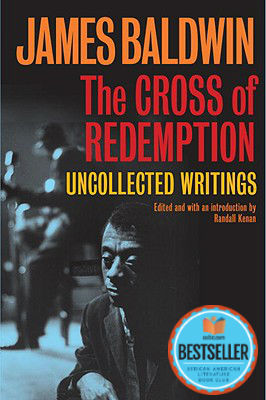Book Review: The Cross of Redemption: Uncollected Writings
Read an Excerpt from The Cross of Redemption: Uncollected Writings
Reviewed by:
ThumperIt has not been said for a long time. I’m glad to be able to say,
James Baldwin has a new book out! The new
collection of essays is The Cross of Redemption: Uncollected Writings. I was
ecstatic when I saw that a new volume was being added to the Baldwin canon.
The collection contains essays and speeches by Baldwin published in book
form for the first time. The collection covers many topics: racism,
educating black children, the past and present state of American literature,
and more. The essays show Baldwin as a preacher, teacher, and the smart
aleck kid in the back of the classroom. Although Baldwin is well regarded as
one of America’s finest essayist, The Cross of Redemption marks the second
time I have ever read any of Baldwin’s essays. I was beyond impressed.
The collection begins with Baldwin discussing writing and his motivation for
writing, Mass Culture and the Creative Artist: Some Personal Notes. At the
center of Baldwin’s writing, according to Baldwin, is the search for,
recognizing and dealing with truth. He states that it’s the novelist
responsibility; a writer’s calling to tell the truth. The writer is to
expose all of the truth he can bear and then go a little farther. The
purpose of the artist is to reveal the truth of his people. Baldwin held
himself and other writers to this standard. I could not agree more.
As Baldwin took Richard
Wright to task in the essay Everybody’s Protest Novel, it is William
Faulkner, Ernest Hemingway, F. Scott Fitzgerald and
John Dos Passos turn to fall into Baldwin’s mouth in As Much Truth as
One Can Bear. Most of you know that I love Faulkner, so I was anxious to
hear what Baldwin to say about him. I like Fitzgerald too. I have to
disagree with Baldwin on Hemingway because, frankly, I don’t see what so
impressive about his writing. Hemingway’s prose is a stiff as a
Viagra-induced hard on. Baldwin is of the opposite opinion. I had not heard
of John Dos Passos. I have no opinion of Dos Passos writing style. Since I’m
a curious type of fellow when it comes to literature, I wrote his name down
in my notebook and plan to read Dos Passos in the near future. Baldwin’s
examination of these writers was on the same plateau as watching a surgeon
performing an operation as he is explaining what he’s doing and why he’s
doing it. The blood and the moving around of human body parts are uneasy,
but I could not help but be fascinated.
In other essays, Baldwin examines the limits, nuances, styles, the
elasticity and various characteristics of language. He states his opinions
on the validity of black language, Language, Race and the Black Writer, and
on what we now call Ebonics, Black English: a Dishonest Argument as well as
the validity of jazz and blues as literary narrative forms, The Use of the
Blues and Of The Sorrow Songs: The Cross of Redemption. Naturally, with the
current state of black literature on my mind, I couldn’t help but to think
what would Baldwin think of the black authors today? Where would their books
fall on Baldwin’s truth scale? Could today’s black literature support the
weight of such critical analysis? Would such analysis be relevant?
In a testimony before a congressional panel discussing teaching Negro
history, in conjunction with American history (how can the two really be
separate?) comes The Nigger We Invent. The Nigger We Invent has a timeless
quality because the essay could have been written today, especially in light
of the recent move by the Texas state legislature to rewrite its current
history school textbooks in order to make my white people not look so bad.
What would Baldwin had thought about that?
My favorite section of the collection is the Profile section, where Baldwin
writes profiles of Sidney Poitier, Sidney Poitier, and Floyd Patterson and
Sonny Liston, The Fight: Patterson vs. Liston. In case you don’t know, I am
a major boxing fan and have been for most of my life. My interest was more
than piqued when I saw the profile, The Fight: Patterson vs. Liston. Baldwin
writes of the time he spent with the two fighters before the legendary bout.
Baldwin came away from those interviews with a perception of Sonny Liston
that I had not heard before. Liston had more depth, intelligence and
character than had been attributed to him. Baldwin’s sense of observation is
keen, as if he morphed into a camera. The profiles were written as if he
leaned over and whispered in my ear; come on, let me show you something, and
I was privy to his every thought and emotion. I loved it.
I’m not a usual reader of essays because I would like to talk back to the
writer. I sat and heard what the writer had to say about an issue, it’s only
fair that he hear what I have to say about it. I know it’s silly, and I
can’t get over it. Even I have to take my hat off to Baldwin. His writing
was diamond: sparkles, flashes and hard. The beginning of the collection,
Baldwin states the purpose of his writing was to tell the truth. He
succeeds. The Cross of Redemption is a remarkable collection.
Related Links
Read an Essay from this collection
"Why I Stopped
Hating Shakespeare"


